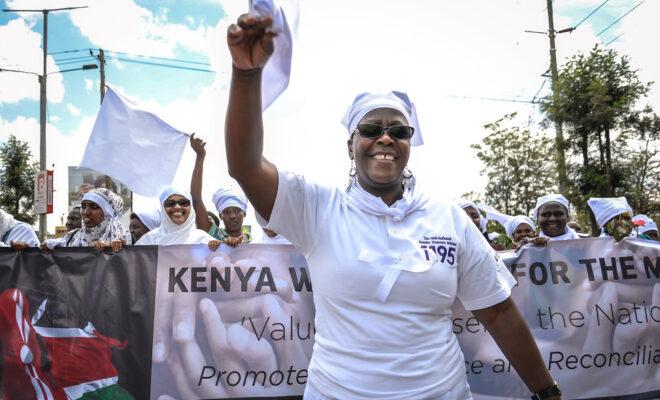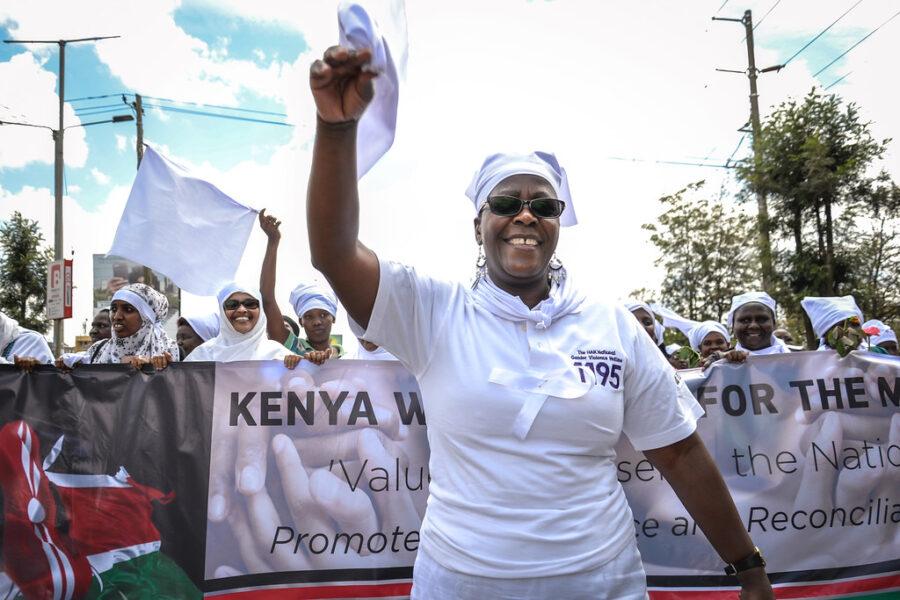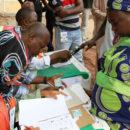How to win elections in Kenya: be rich and don’t be a woman

In Kenya’s previous elections, senators spent an average $319,000 in getting elected.

Ahead of Kenya’s 2017 elections, the White Ribbon Campaign march to promote their rapid response hotline which responds to violence against women in elections. Credit: Carla Chianese, IFES.
Kenya’s general elections, scheduled for 9 August 2022, are now less than a year away. It’s too early to say what the country’s political landscape will look like after the vote, but we do know something about who will get elected – those who can afford it.
In Kenya, campaign financing laws and regulations are rarely enforced. Some new rules were recently proposed, but politicians are keen to avoid discussing electoral expenditure. They know that winning elections is more about spending money – and then making money – than worrying about constituents’ wellbeing or coming up with a compelling political ideology. As our recent research in collaboration the Westminster Foundation for Democracy (WFD), the Netherlands Institute for Multiparty Democracy (NIMD), and Mzalendo shows, this means that access to Kenya’s political spheres is based on affluence rather than passion or aptitude.
We found that candidates who were successfully elected to the National Assembly in the 2017 general elections spent an average KSh18.2 million ($166,000) during their campaigns. Those elected to the Senate expended an average KSh35 million ($319,000). In many constituencies – especially those in which one party dominates – most of the expenditure occurs during party primaries. Senators, for instance, spent an average KSh19.2 million ($175,000) during these internal contests to win their party’s nomination, compared to KSh16.3 million ($148,000) in the subsequent national election.
In both instances, the vast majority of costs seem to have come from the aspirants’ own pockets. Three-quarters of the those surveyed said they received no or very little support from their political party.
Running as a woman
To put it simply: if you want to win a political position in Kenya, be rich and spend big. The more you spend, the greater your chances of winning – unless you are a woman.
Our research also found a significant gender disparity. Far fewer women make it to the ballot or win seats but they spend significantly more. In trying to win seats in the National Assembly, for instance, women spent an average of KSh23.6 million ($240,000) compared to men’s average of KSh17 million ($155,000).
Female candidates face multiple challenges arising from Kenya’s deep-seated patriarchal norms. For example, it is seen as improper for women to lead largescale rallies or campaign late into the evening. This means that they must rely on more costly and labour-intensive strategies such as smaller events, door-to-door canvassing, and face-to-face meetings. Female candidates are also typically held to higher standards than men, while many voters simply believe women should not be in politics to begin with. As one respondent told us, “some people still think that the woman’s place is in the kitchen”. Kenya’s “big man” politics puts women at a disadvantage too. In this political culture, candidates’ ability to solve local challenges is seen to be determined by their proximity to the centre of power, and this usually means being male.
There have been attempts to increase female representation in Kenya politics. The 2010 constitution, for instance, created a new “county woman representative” position that set aside 47 seats in the National Assembly that only female candidates could contest. This has increased the proportion of women in parliament, but has also had the undesirable side-effect that remaining 290 directly-elected seats have been perceived by many as “men-only seats”.
Fixing the system
In Kenya, politics is the preserve of the rich or, more specifically, rich men. To change this, the country needs a holistic, transparent and effective campaign finance infrastructure. To begin with, the 2014 Election Campaign Finance Act, which set spending limits, must be actively enforced. It is only with caps on expenditure that Kenya’s vastly skewed playing field can be levelled and the transactional nature of politics can be challenged.
It will also be necessary to reject the prevailing perception that women should only compete for affirmative action seats. Female candidates will need to be encouraged and supported to compete for the full range of positions. The constitutional provision that no more than two-thirds of the National Assembly or Senate can be of the same gender needs to be enforced, while gender quotas for party primaries and a reduction of electoral fees for women contesting at all levels could also help increase representation.
Unfortunately, the people with the greatest capacity to change the status quo are the very ones who most benefit from it. This means that the 2022 elections will be likely to follow the same patterns as those in 2017. Less affluent Kenyans and women will, once again, be largely excluded.






AND EVEN IF YOU SAY IT EITHER WAY
One must be tribal and understand how to twist the minds of—my brother–ndugu yangu
The on going fighting in Ethiopia is like that Mexico did to mayan. Killing and women rape is highly taking place in Tigray and other regions and the UNITED NATIONS ought work even harder to bring down this deadly conflict